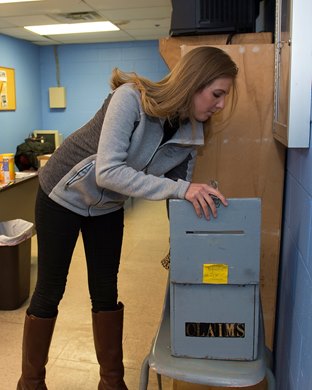HISA Claiming Rules Bring Horses Consistent Protection


Trainer Mark Casse is not one to keep things close to the vest when his emotions run deep. Whether it's an equine protégé he is particularly high on, or an industry issue he believes is paramount, the Hall of Fame conditioner will let you know why the subject at hand inspires such forceful opinions on his part.
So, when the voided claim rule was brought up to the man who maintains one of the most far-flung operations in Thoroughbred racing, it was telling that he didn't resort to "trainer speak" in describing the impact of the now standardized regulation.
"I think it's a great rule that has probably saved as many horses' lives as any," Casse said.
What Casse is specifically referring to are claiming race rules put in place in states in recent years and updated and standardized when the Horseracing Integrity and Safety Authority's Racetrack Safety Program took effect July 1, 2022.
While voided claim guidelines were initially brought to the forefront during the 2006 Welfare and Safety of the Racehorse Summit and subsequently implemented in states like California, Kentucky, Delaware, Maryland, and Pennsylvania, there was little uniformity around the regulations and, in some jurisdictions, spotty enforcement.
The inconsistency in the state-to-state rules meant that circumstances that caused a claim to be voided in one state were not necessarily reasons to void a claim in another state. In some states it might be that if a horse suffered a catastrophic injury in a race, a claim was automatically voided. In other states, it might be that if a horse was vanned off, stewards had the discretion to void a claim.
While the state-to-state rules did protect horses, the differences in standards and arbitrariness of enforcement were confusing and reduced the overall potential to strengthen the safety net. Hence, bringing consistent nationwide standards to the table was among HISA's initial priorities.
Under Rule 2262 of the HISA regulations, claims are now voided if "the horse dies, is euthanized, bled, is vanned off the racetrack, or is later found to test positive for a prohibited substance." The rule stipulates all claimed horses head to the test barn to be observed by a regulatory veterinarian and that the claim will be voided if the horse is determined within one hour of the race to have bled, be physically distressed, medically compromised, unsound, or lame.
Those submitting a claim can opt out of a potential void ahead of the race. To do this, on the claim slip they note that they will accept the horse even if the regulatory veterinarian determines he or she will be placed on the vets' list, if the horse bled, or if they test positive for a prohibited substance. (A reason this might be done is if a horse is being claimed as a potential broodmare prospect, for instance.)

Of course the majority of horsemen will do their best to make decisions that do not endanger the horse, but such rules are made to protect horses—and the sport's reputation—from the individuals who prioritize monetary gain over the welfare of the equine athlete.
"For so long, a lot of owners and trainers really didn't take the horse's welfare into consideration. The only thing would be, get them over there and get them claimed and whatever happens, happens," Casse said. "That is no longer the case."
Casse brought up a strength of the rule that might not immediately come to mind for non-horsemen. He noted that in situations where the owner is not prioritizing the horse's welfare, the rules can help trainers push back against that pressure.
"If the owner insists 'Run him, run him, he'll get claimed.' Now, a trainer is able to say, even if he did get claimed, he's not going to pass the vet afterwards. So, I think it's probably helped a lot of trainers in that way because...there are a lot of trainers out there that if they don't listen (to the owners), they lose their jobs.
"Now, if this horse runs and doesn't come back good, you're going to get him back and he's going to go on the vets' list. So, let's do the right thing, get the horse better. It takes a lot of the risk out of it, but it's also what is best for the horse."
Before he joined HISA in June 2022 as director of stewarding and state racing commission relations, Marc Guilfoil spent more than three decades with the Kentucky Horse Racing Commission. Having seen firsthand what implementation of the voided claim rule looked like in the Bluegrass State, he knew as well as anyone that contrarian opinions would shift as positive results streamed in.
"I think it's one of the single pieces of regulation that's out there that actually really, really works," Guilfoil said. "They all work in a sense or else we wouldn't have them as regulations, but this one really works and helps the safety and welfare of the horses because it really pushes people into making the right decision."

Statistically, there is evidence to support the notion that the voided claim rule benefits the well-being of the horse. During the 2020 Welfare and Safety of the Racehorse Summit, Dr. Tim Parkin, head of the Bristol Veterinary School in the United Kingdom and consultant on The Jockey Club Equine Injury Database, presented data showing tracks with voided claim rules have fewer fatalities per start than tracks without them.
As more states have come under the HISA rule, Guilfoil has heard some of the same concerns he once heard as the rule was considered and put in place in Kentucky but his positive experience there provides a ready answer.
"To the people who are doubting the rule or who were starting to doubt the rule, I was like guys, 'I've already been to this movie. I saw this happen in Kentucky and I heard the same arguments against, and I know how the story ends,'" Guilfoil said. "It's going to end good."
Guilfoil likes that the rule encourages human connections to take their time with a horse. By giving a horse more time, Guilfoil believes worst-case scenarios are avoided.
"When the vet tells you that you need two weeks of this or a week of that; the horse needs that. (Horseman and regulator) Ned Bonnie told me a long time ago that time cures a lot. And a lot of time these horses just need a little bit of time," Guilfoil said. "This (rule) gives them that extra time."
In an effort to encourage horsemen to allow time for a horse, HISA rules also offer a waiver claiming option in which an owner or trainer can declare a horse ineligible to be claimed if the horse has not started in 120 days after racing for a tag in its previous outing and is entered for a claiming price equal or greater than the price it most recently started. With this guideline in place, a horse's connections can put the time into getting their horse right without worrying that someone else will benefit from that investment through an immediate claim.
"Why that is such a good rule is if you have a horse for instance that is a $50,000 claimer and he needs time off or needs a chip taken out of his ankle, the way it has been in the past, is you would go do all this work, spend a lot of money, talk your owner into giving the horse time and doing the right thing, and then when you ran that horse back for $50,000 claiming, someone would claim it off of you," Casse said. "So, you've spent all this money, you're trying to run him where the horse would be competitive and...the person can go and claim the horse with really very little risk. They don't have to worry the horse has been off four months.
"I know (the waiver claiming option) worked for us on numerous occasions where we've given horses time off, brought them back and are able to run them in the same claiming race but not for the price. The horses have won and have paid for their four months of being off."
Having a horse's medical records passed to new connections would seem a common-sense routine in the interest of the animal, but that practice was not mandated until the HISA guidelines were put in place. Now when a horse is successfully claimed, the previous trainer must transfer trainer records—records of medical, therapeutic, and surgical treatments and procedures—to the new conditioner within three days.
"When those horses change hands, a different set of connections has to learn what is important to that horse in terms of their recovery time between races or their preparation for the next start," said Dr. Stuart Brown, vice president of equine safety for Keeneland. "I think a part of it is the veterinary wellness. I think putting a safeguard in place like the voided claim rule also helps to make sure that those kinds of things like the transfer of information with recordkeeping is taking place."
The Equine Injury Database has found increased risk for horses when they are moved to a new trainer. The passing of medical records to the new conditioner aims to reduce that concern.
Brown points out that not only have the horses themselves benefitted from nationwide rules regulating the claiming of horses, but the regulations have also aided the veterinarians who have to make observational determinations about a horse. More than one veterinarian has relayed to Brown that they are using the criteria of the regulatory voided claim examination when assessing a horse for entry.
"It's really important to recognize that the attending veterinarians now are also having those intentional conversations with their clients when they assess those patients and that is huge in terms of planning, and the management of a horse," Brown said. "Let's say the horse has an issue with his hocks and there are some number of months from where there has been potentially a treatment provided for that horse and they know that with some frequency a few times a year that has to be addressed. That is something that is being factored into how a horse will come out of its race in terms of being presentable to the next trainer."
No rule is perfect and scenarios are always going to manifest that aren't covered, even under the most well-crafted guidelines. As such, revisions to the claiming rules have been submitted to the Federal Trade Commission, including a rule that says the claimant will be promptly notified if a horse's post-race sample comes back positive and that the claimant will then have 48 hours to decide if they want the claim voided.
"There are going to be a couple of changes and tweaks to the voided claim rule...and they'll come in as soon as the FTC approves the regs—we're hoping sometime in July," Guilfoil said. "There are going to be some nuances, there is always, 'What if this happens or this or this,'...Murphy's Law was invented around horse racing. But we're always open if someone has another idea they want to put forth.
"If you can explain why something makes sense and will help the welfare of the horse, it will be strongly considered and likely put into practice. Because the horse is the centerpiece."
